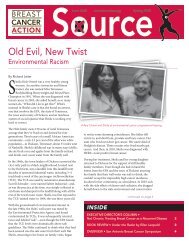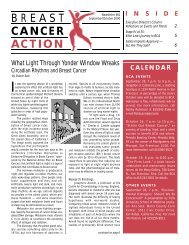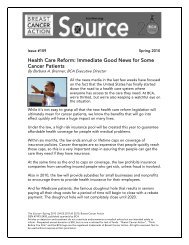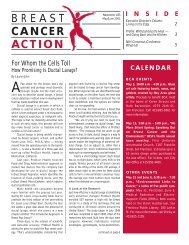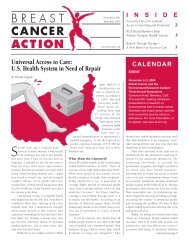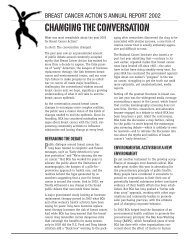BREAST CANCER ACTION - Return to Home Page - Breast Cancer ...
BREAST CANCER ACTION - Return to Home Page - Breast Cancer ...
BREAST CANCER ACTION - Return to Home Page - Breast Cancer ...
You also want an ePaper? Increase the reach of your titles
YUMPU automatically turns print PDFs into web optimized ePapers that Google loves.
10<br />
February/March 2004<br />
<strong>Breast</strong> <strong>Cancer</strong> Action<br />
Impressions From San An<strong>to</strong>nio<br />
continued from page 1<br />
disappointing results of its Phase III trials in<br />
metastatic breast cancer patients last summer.<br />
In San An<strong>to</strong>nio, the company presented a<br />
subset analysis that, while not conclusive in<br />
itself, offers a possible direction for new trials.<br />
Patients with ER+ tumors receiving hormonal<br />
treatments while undergoing Thera<strong>to</strong>pe<br />
showed a trend (not a statistically significant<br />
difference) <strong>to</strong>ward better time <strong>to</strong> disease<br />
progression and overall survival [Miles 36].<br />
Determining which patients are most<br />
likely <strong>to</strong> respond can transform a drug failure<br />
in<strong>to</strong> a success. The monoclonal antibody<br />
Herceptin would never have shown a benefit<br />
in breast cancer, Genentech researchers say,<br />
had they not been able <strong>to</strong> develop a test that<br />
predicted Herceptin response.<br />
To date, however, Genentech<br />
has been unable <strong>to</strong> devise such a<br />
test for its new drug Avastin ® ,<br />
which targets VEGF, a gene<br />
responsible for angiogenesis (the<br />
growth of blood vessels that feed<br />
tumors).<br />
Straightforward tests for<br />
gene expression are not always<br />
useful, it seems. Many if not most of the new<br />
agents don’t show enough activity by<br />
themselves, at least not in a general patient<br />
population. So, for rational combinations <strong>to</strong><br />
be designed, much more must be learned<br />
about the complex signaling pathways within<br />
cancer cells, crosstalk between genes, and<br />
messages from outside the cancer cell that<br />
govern cell proliferation and cell death<br />
(apop<strong>to</strong>sis).<br />
Although it is now “hot,” the genomic research<br />
paradigm is not the only avenue worthy<br />
of exploration. Which cancer cells researchers<br />
target may be important, as Max Wicha, of the<br />
University of Michigan, suggested in a plenary<br />
talk in San An<strong>to</strong>nio [Wicha P1]. His research<br />
elegantly demonstrates that tumor stem cells,<br />
the original cells from which all other cancer<br />
cells differentiate, may turn out <strong>to</strong> be of crucial<br />
importance in explaining drug resistance and<br />
the incurability of many cancers. Pointing <strong>to</strong><br />
the notable success in curing metastatic testicular<br />
cancer, Wicha suggested that therapies<br />
designed <strong>to</strong> target only stem cells may be<br />
much more effective.<br />
Mining the Past <strong>to</strong> Predict the Future:<br />
Is It Possible?<br />
With the introduction of microarray and<br />
related technologies a few years ago, where<br />
the entire genetic fingerprint of a cancer (or<br />
the most relevant genes) could be analyzed on<br />
a single chip, the door seemed <strong>to</strong> swing wide<br />
<strong>to</strong> precise individualization of treatment.<br />
A single test would have the power <strong>to</strong> predict<br />
the risk of recurrence, and then <strong>to</strong> tell a<br />
woman with breast cancer exactly which<br />
treatments she needed—or whether she<br />
needed no further treatment after surgery, an<br />
even more powerful revelation for the<br />
majority of newly diagnosed women whose<br />
breast cancers are actually cured by surgery<br />
alone. The concept was mind-boggling.<br />
Imagine no more overtreatment or<br />
undertreatment. No more one-size-fits-all.<br />
And for many if not most of us, there would<br />
be the certainty of knowing we were cured.<br />
Such were the hopes. So far, the possibilities<br />
have proven <strong>to</strong> be just that—possibilities.<br />
Determining which patients are<br />
most likely <strong>to</strong> respond can transform<br />
a drug failure in<strong>to</strong> a success.<br />
The study poised <strong>to</strong> be this year’s<br />
breakthrough news involved the use of the<br />
multi-gene RT-PCR test <strong>to</strong> predict recurrence,<br />
a new 21-gene microarray developed by<br />
Genomic Health. This test is derived from a<br />
combination of genes known <strong>to</strong> govern primarily<br />
cell proliferation and hormonal<br />
regulation in tumor cells. The revolutionary<br />
premise here is that this test is done on<br />
standard diagnostic pathology specimens,<br />
namely, archived, paraffin-embedded tumor<br />
tissue. If this is proven useful, researchers will<br />
be able for the first time <strong>to</strong> correlate archived<br />
tumor tissue with known patient outcomes<br />
from studies initiated and completed years<br />
ago, avoiding lengthy and costly “prospective”<br />
clinical trials.<br />
The validation study for RT-PCR was<br />
done through the National Surgical Adjuvant<br />
<strong>Breast</strong> and Bowel Project, one of the cancer<br />
cooperative groups responsible for many<br />
important clinical trials. Researchers hoped <strong>to</strong><br />
predict who was most and least likely <strong>to</strong> have<br />
a recurrence, based on tumor tissue alone.<br />
Using samples of the tissue of 668 nodenegative<br />
breast cancer patients with ER+<br />
tumors who were treated with tamoxifen<br />
during the 1980s, the study authors said that<br />
they were able <strong>to</strong> predict outcome better than<br />
any single prognostic fac<strong>to</strong>r, apart from tumor<br />
grade. The “low risk” group they identified<br />
had a risk of recurrence of 6.8 percent at 10<br />
years, while the “high risk” group had a<br />
recurrence rate of 30.5 percent [Paik 16].<br />
Genomic Health, who will be marketing<br />
this test as Oncotype DX early in 2004 for a<br />
minimum of $3,000, claims that it will help<br />
women with node-negative ER+ tumors<br />
taking tamoxifen (as most such patients do)<br />
select treatment more wisely. But even if the<br />
test is confirmed in other studies, how much<br />
will it really help the individual woman? How<br />
will the results be confounded if Arimidex ® is<br />
widely accepted as standard of care, rather<br />
than tamoxifen? Is a 6.8 percent risk of<br />
recurrence low enough for a woman <strong>to</strong> feel<br />
comfortable refusing tamoxifen? Wouldn’t a<br />
woman in the highest risk group be<br />
considering chemotherapy anyway? Today,<br />
oncologists combine fac<strong>to</strong>rs<br />
when considering prognosis,<br />
including tumor size, involved<br />
lymph nodes, tumor grade, etc.<br />
Several complex algorithms that<br />
feed recent data from clinical<br />
trials in<strong>to</strong> a computer program<br />
are freely available <strong>to</strong> assist in<br />
this task, such as Adjuvant at<br />
www. adjuvan<strong>to</strong>nline.com. So,<br />
it’s unclear what this test will add <strong>to</strong> the<br />
picture, even if its results are widely<br />
confirmed.<br />
And speaking of confirmation, another<br />
study presented at the conference, using the<br />
same test in a similar population, some of<br />
whom who did not receive tamoxifen, was<br />
conducted at M.D. Anderson <strong>Cancer</strong> Center.<br />
This study failed <strong>to</strong> show any predictive value<br />
for recurrence [Esteva 17]. So, much more<br />
work is clearly needed. A fundamental<br />
question <strong>to</strong> be asked here, according <strong>to</strong><br />
statistician Donald Berry of the M.D.<br />
Anderson <strong>Cancer</strong> Center, is whether these<br />
incredibly complex analyses of genetic<br />
expression are likely <strong>to</strong> ever provide reliable,<br />
reproducible results, given the multiplicity of<br />
potential data points, the difficulties with<br />
uniform data collection and pathology, and a<br />
variety of other statistical and methodological<br />
issues that make interpretation of tests like<br />
this fraught with problems. ◆<br />
Musa Mayer is a 14-year survivor and the author<br />
of four books including, most recently, After<br />
<strong>Breast</strong> <strong>Cancer</strong>: Answers <strong>to</strong> the Questions<br />
You’re Afraid <strong>to</strong> Ask (O’Reilly, 2003). She<br />
provides information and support for women with<br />
metastatic breast cancer daily at www.bclist.org<br />
and www.bcmets.org.<br />
THE NEXT SAN ANTONIO <strong>BREAST</strong> <strong>CANCER</strong> SYMPOSIUM WILL BE DECEMBER 8–11, 2004…



